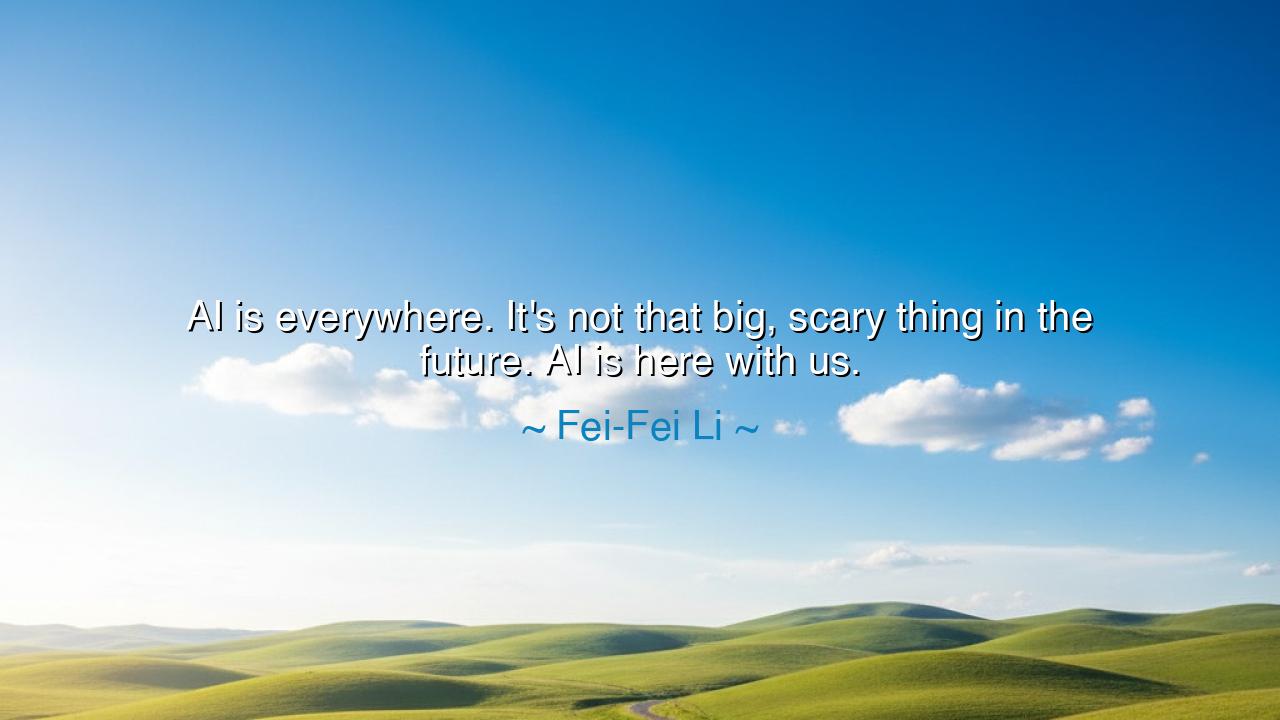
AI is everywhere. It's not that big, scary thing in the future.






In the halls of history, there have always been moments when humanity faced the advent of change, when the future, once a distant concept, suddenly surged forward and arrived at their doorstep. Fei-Fei Li’s words, "AI is everywhere. It's not that big, scary thing in the future. AI is here with us," serve as a profound reminder that the great forces of transformation are not always distant and unknown, but already embedded in the present. Artificial intelligence, once a distant dream of science fiction, has moved from the pages of novels to the very fabric of our everyday lives, shaping industries, societies, and the way we think about our world.
In the ancient world, there were those who foresaw the future and attempted to prepare their people for the changes that were to come. Pythagoras, the great Greek philosopher, is said to have dreamed of an interconnected world, where numbers and mathematics could explain the mysteries of the universe. Though his vision was centuries ahead of its time, his belief in the power of numbers laid the foundation for later mathematical and scientific advancements. Similarly, Fei-Fei Li’s words challenge us to recognize that AI is not some distant threat but a force that is already at work, shaping the world around us. Just as Pythagoras’ theories set the stage for a future understanding of the universe, AI today is laying the groundwork for new discoveries, innovations, and even philosophical questions about the nature of intelligence and consciousness.
Consider the Renaissance, that era of profound transformation, where figures like Leonardo da Vinci and Michelangelo were pioneers not only in art, but also in science and engineering. The innovations of the time were not seen as threats to the status quo, but as the necessary building blocks for a more enlightened future. Just as Leonardo’s sketches of flying machines and anatomical studies seemed fantastical to his contemporaries, the rise of AI may seem like a distant dream to some. Yet, just as da Vinci’s ideas gave rise to practical inventions in the centuries that followed, AI today is no longer confined to theoretical speculation—it is already reshaping our lives in tangible ways.
The rise of AI can be likened to the great discoveries that have changed the course of humanity, from the wheel to the printing press to the electric light. In each case, people feared the unknown, unsure of the implications of these new technologies. Yet, the great philosophers and inventors of the past understood that true progress lies in embracing the tools of change. Just as the ancient Sumerians invented writing to preserve knowledge and empower future generations, AI is today offering us a tool to not only enhance our abilities but to explore new frontiers of human potential. The question is not whether AI will reshape the world, but how we will use it to serve humanity and ensure a better, more just future.
AI, in its many forms, is already woven into the fabric of our lives. Autonomous vehicles drive our streets, algorithms power our social media, and data systems determine the way businesses function. But as with all great changes, there are both opportunities and challenges. In the ancient world, the rise of empires often brought with it both advancement and destruction. The Roman Empire, with its vast networks of roads, aqueducts, and communications, also fell into decay when those very systems were not maintained and exploited properly. AI, as Fei-Fei Li points out, is here with us now, and we must be vigilant in how we use it. Will we build a world where AI amplifies human creativity and compassion, or one where it deepens inequality and surveillance? It is up to us to navigate this new era with wisdom, just as the ancients navigated the challenges of their time.
The lesson from Fei-Fei Li’s reflection is that we must cease to view AI as something distant or unknowable. The future is already upon us, and with it comes the opportunity to shape it for the betterment of all. Just as ancient societies built their futures through the tools they created, we must embrace AI as a tool for good, guided by the principles of ethics, justice, and human flourishing. In this, we find a responsibility not just to the present, but to the future generations who will inherit the world we create today.
Let us, then, not fear the rise of AI, but see it as an opportunity to build a future where technology is harnessed for the greater good. Like the great innovators of the past, we must rise to the challenge of shaping a world where progress is not an abstract concept, but a concrete reality that benefits all people. In doing so, we can ensure that the future we leave behind is one that is filled with opportunity, prosperity, and human dignity. AI is not a distant dream; it is our reality, and we must choose wisely how to wield its power.






AAdministratorAdministrator
Welcome, honored guests. Please leave a comment, we will respond soon